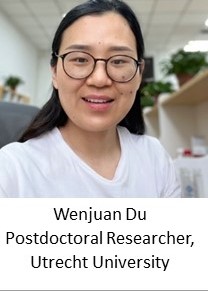May 30th 2024
CARE’s Young Researcher – Wenjuan Du
CARE’s Young Researchers – Introducing Wenjuan Du, Post-doctoral researcher, Utrecht University
Read about how Collins’s work in understanding how the coronavirus hijacks human host factors and processes has provided us with opportunities to develop therapies to inhibit viral replication.
CARE (Corona Accelerated R&D in Europe) is the largest European research initiative addressing the challenges of COVID-19. It comprises 38 partners, from both industry and academia, in a set-up of eight multidisciplinary work-packages (WPs). In this series, we highlight the work of some of the young researchers involved in CARE as part of their PhD or postdoctoral work. Here, we learn how this opportunity has benefited Wenjuan (Utrech University), while simultaneously benefiting CARE and its ambition to help society defeat COVID-19 and future pandemics.

What experience did you have working on a Public Private Partnership before joining CARE?
Before joining CARE, I had limited experience working in Public Private Partnerships.
Why did you decide to get involved in CARE?
I completed my doctoral studies in June 2020, at a time SARS-CoV-2 had become a serious health problem worldwide. I was highly motivated to contribute to the fight against SARS-CoV-2 and saw CARE as an excellent network to join.
How did your involvement in CARE come about?
My involvement with CARE stemmed from my doctoral research within the Virology laboratory at Utrecht University. My experience with molecular virology, antibody expression and neutralization assays made me well suited for the antibody research endeavors within Work Package 4 of the CARE research program.
Tell us about the work you have been doing in the CARE consortium
Within the consortium, my responsibilities have been diverse. They included setting up assays monitoring SARS-CoV-2 variants and characterizing antibodies that were developed by our WP4 partners. We evaluated the neutralization potency and breath of SARS-CoV-2 antibodies by using a pseudovirus system. More recently we started to develop human monoclonal antibodies against the emerging porcine deltacoronavirus (PDCoV), to enhance pandemic preparedness against this virus which can infect humans. We identified several antibodies with virus neutralizing activity, one of which targets a conserved epitope that is shielded from antibody recognition by other domains in the natural spike conformation. This antibody exhibits broad reactivity against related deltacoronaviruses and shows potential for future therapeutic use. Our studies on these antibodies have also provided more insight in PDCoV Spike-mediated cell entry. These findings are soon to be published in Nature Communications.
What highlights can you share from your time in the CARE consortium so far?
Highlights from my time in the CARE consortium include identifying antibodies with broad neutralization activity, particularly those that target conserved epitopes. These results have given me a great sense of accomplishment.
Why does this work matter?
Our research has deepened our understanding of the humoral immune response to combat coronaviruses and the potential for these RNA viruses to evade from it. Our efforts have underscored the potential of antibodies targeting conserved epitopes on the spike protein to serve as therapeutic agents against future emerging coronaviruses.
What are or were the biggest challenges you have experienced (and how did you overcome them?)
I have benefited by acquiring new experimental skills, strengthening critical thinking, and expanding my professional network. Additionally, CARE provided me the opportunity to work with a great team of scientists in Utrecht, as well as with other scientists from academic and private partners within WP4, which was a rewarding and enriching experience.
How have you benefited from your involvement in CARE?
I have benefited immensely by interacting with experienced industry and academia experts who are willing to mentor and guide the upcoming scientists within the consortium. I have been able to sharpen my technical as well as interpersonal skills since I joined the consortium.
